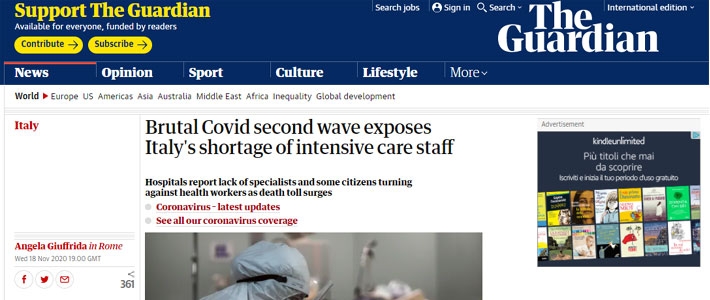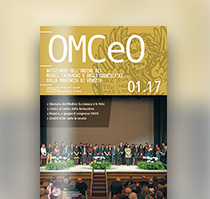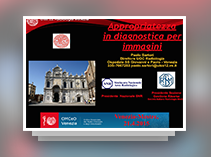- Home
- News
- Odontoiatri
Tu sei qui
Home › Segreteria OMCeO Ve › Mancano gli specialisti in terapia intensiva: Leoni su The Guardian ›Mancano gli specialisti in terapia intensiva: Leoni su The Guardian
Data di inserimento: Giovedì, 19/11/20 - Segreteria OMCeO Ve

Carenza di specialisti e andamento del contagio, con i decessi in aumento in questi ultimi giorni, i temi affrontati dal presidente dell'OMCeO veneziano e vicepresidente FNOMCeO Giovanni Leoni in un'intervista rilasciata ad Angela Giuffrida per The Guardian e pubblicata ieri, mercoledì 18 novembre 2020. «I letti e i ventilatori - sottolinea - sono aumentati, ma non il personale. E chi c'è ha un carico di lavoro molto più pesante. Questo è il problema più grande: non è facile trovare anestesisti o infermieri in grado di lavorare in terapia intensiva».
L'intervista integrale può essere letta a questo link diretto: https://www.theguardian.com/world/2020/nov/18/brutal-second-wave-of-covid-exposes-italys-healthcare-weaknesses
Brutal Covid second wave exposes Italy's shortage of intensive care staff
Hospitals report lack of specialists and some citizens turning against health workers as death toll surges
Italian hospitals are struggling with a shortage of intensive care specialists as the country battles a severe coronavirus second wave, while some citizens are also turning against health workers.
Covid-related deaths rose by 731 on Tuesday – the highest daily toll since early April, when Italy was in complete lockdown – and by 753 on Wednesday, as weaknesses in the healthcare system across the country become more exposed.
According to a study by Johns Hopkins University in the US, Italy has recorded four deaths per 100 infections - the third highest rate in the world. Tuesday’s count equated to one death every two minutes.
Admissions to intensive care units have almost doubled to 3,612 since 1 November and the number of people in hospital with coronavirus – 33,074 – has eclipsed that reached during the first wave.
But while Italy has almost doubled the availability of intensive care beds to 9,931 and increased the number of ventilators, only 625 more anaesthetists and resuscitators have been hired since the beginning of the pandemic.
“Beds and ventilators have increased but staff figures have practically stayed the same,” said Giovanni Leoni, the vice-president of the Italian order of doctors.
“And those who are there have a much heavier workload. This is the biggest problem as it’s not easy to find anaesthetists, or nurses able to work in critical care, as it’s such a specialism.”
Many medics have chosen to leave the profession or take early retirement after the trauma experienced in the spring, while some of those working relentlessly have become targets of aggression as some people vent their anger at the healthcare system over the ongoing pandemic.
“We went from being celebrated as heroes to being plague-carriers,” said Giacomo Grasselli, the head of intensive care at Milan’s Policlinico hospital. “Now we’re seen as the ones responsible for the restrictive measures, taking away people’s freedom, and the economic consequences.”
Much like in other countries, Italians clapped and sang from their balconies as they supported healthcare workers during the early days of the pandemic.
Then came a rise in discrimination as people considered them to be carriers of the virus. According to a survey led by Grasselli and other colleagues in Lombardy in the spring, 25% of the 627 medics interviewed across the region reported being targets of discrimination or aggression.
Episodes included having notices with their names on pinned outside lifts in apartment buildings warning them not to enter as they might have Covid, parents banning their children from playing with those of medics, and spouses being barred from shops.
Doctors have also had their car windows smashed and in some cases police intervention was needed. More recently, a mural dedicated to healthcare workers outside Milan’s Sacco hospital was defaced.
And even though a survey on Tuesday showed 61% of Italians still trusted their health system, some people are angry at the professionals who reveal how dire the situation is in hospitals, preferring to believe those who downplay the virus.
Medics have also been accused of earning more money if they treat Covid patients.
“Paradoxically, it’s more difficult to work now than it was in March or April,” added Grasselli. “We warn that if the infection rate doesn’t come down then we’ll run out of beds, and based on that the politicians decide. But then someone else goes on TV and says we’re terrorising people and it’s all an exaggeration, and so people struggle to understand and become less tolerant of healthcare workers.”
Doctors are also facing legal action from bereaved relatives.
“We expected this … but we’re also working in non-conventional ways,” said Grasselli. “We were already carrying the weight of the psychological consequences of what happened in the spring – treating people who couldn’t see their relatives, who couldn’t breathe and then making the call to say they had died – before having to start again.
“But we are trying to cure people and we need solidarity and collaboration from everyone so that we can get through this horrible situation together.”
Italy registered over 32,000 new coronavirus infections on Tuesday. Lombardy is still the worst affected region but while the pandemic was mostly constricted to the north during the first wave, the virus is now raging across the country and seriously testing the ability of hospitals, especially those in the poorer south, to deal with it.
Italy is persisting with a tiered system, which imposes varying levels of restrictions across its 20 regions according to factors including the Covid transmission rate, hospital efficiency and availability of intensive care beds, despite repeated calls from medics for a complete lockdown.
The second wave has already killed 9,000 people across the country, and doctors warned last week that there will be an additional 10,000 deaths by early December unless more aggressive measures are implemented.
Angela Giuffrida
Segreteria OMCeO Ve
Categoria News:
Dalla Rete
Pagina visitata 1231 volte










